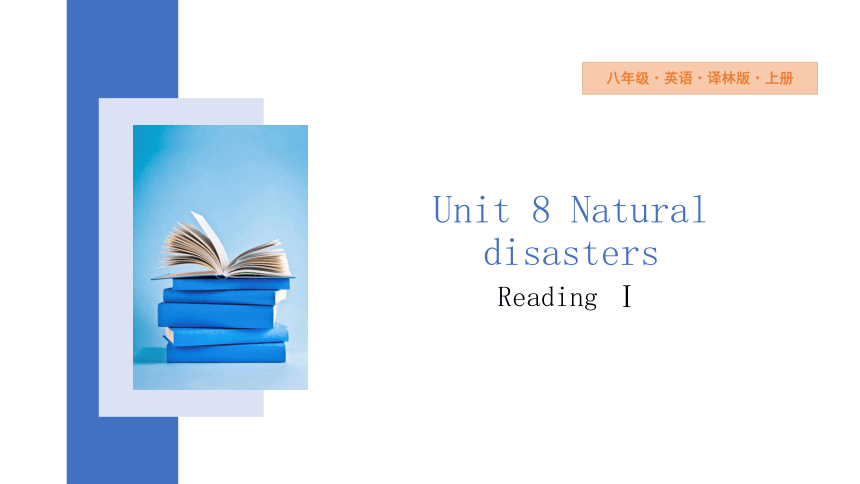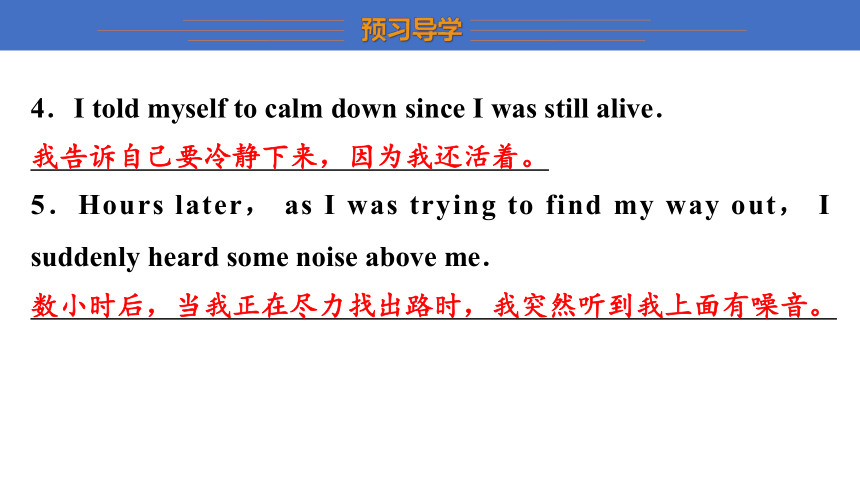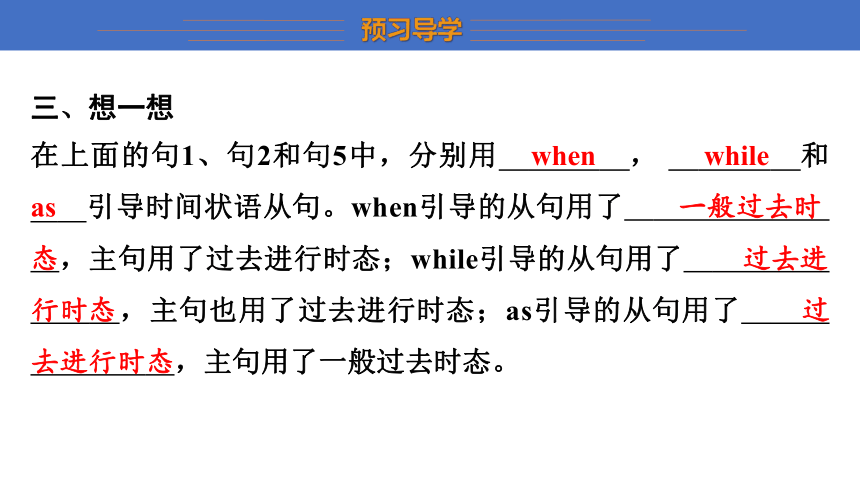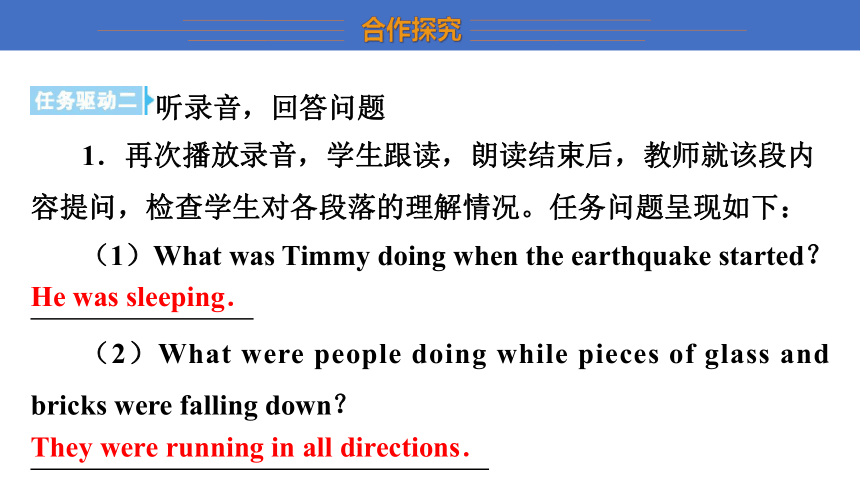Unit 8 Natural disasters Reading Ⅰ课件(共23张PPT) 牛津译林版英语八年级上册
文档属性
| 名称 | Unit 8 Natural disasters Reading Ⅰ课件(共23张PPT) 牛津译林版英语八年级上册 |

|
|
| 格式 | pptx | ||
| 文件大小 | 638.2KB | ||
| 资源类型 | 教案 | ||
| 版本资源 | 牛津译林版 | ||
| 科目 | 英语 | ||
| 更新时间 | 2024-01-12 00:00:00 | ||
图片预览









文档简介
(共23张PPT)
八年级·英语·译林版·上册
Unit 8 Natural disasters
Reading Ⅰ
1.记住并会准确运用下列单词及短语:shake, loud, fear, direction, in all directions, while, come down, shaking, silent, not...at all, if, nervous, heart, beat, mind, since, still, alive, dark, find one’s way out, shout, at last, daylight, safe。
2.通过阅读训练,学会运用过去进行时态描述地震状况,用适当的语言向他人介绍地震灾害。
3.通过本课的学习,学生能够了解地震的危害,提高自我保护意识。
一、变一变
1.shake→ shake / shaking n.
→ shook 过去式
2.direct→ direction / director n.
3.wild→ wildly adv.
4.loud→ loud / loudly adv.
5.trap→ trapped 过去式
shake / shaking
shook
direction / director
wildly
loud / loudly
trapped
二、译一译
1.I was sleeping when the earthquake started.
当地震开始的时候,我正在睡觉。
2.People were running in all directions while pieces of glass and bricks were falling down.
当碎玻璃片和砖块往下掉落的时候,人们在四处逃散。
3.I felt nervous and my heart was beating fast.
我感到紧张,我的心脏在快速地跳动。
当地震开始的时候,我正在睡觉。
当碎玻璃片和砖块往下掉落的时候,人们在四处逃散。
我感到紧张,我的心脏在快速地跳动。
4.I told myself to calm down since I was still alive.
我告诉自己要冷静下来,因为我还活着。
5.Hours later, as I was trying to find my way out, I suddenly heard some noise above me.
数小时后,当我正在尽力找出路时,我突然听到我上面有噪音。
我告诉自己要冷静下来,因为我还活着。
数小时后,当我正在尽力找出路时,我突然听到我上面有噪音。
三、想一想
在上面的句1、句2和句5中,分别用 when , while 和 as 引导时间状语从句。when引导的从句用了 一般过去时态 ,主句用了过去进行时态;while引导的从句用了 过去进行时态 ,主句也用了过去进行时态;as引导的从句用了 过去进行时态 ,主句用了一般过去时态。
when
while
as
一般过去时
态
过去进
行时态
过
去进行时态
找出重要单词和词组
播放一段地震的视频,引入台湾大地震的话题,然后听读Reading部分的课文,找出本课中一些重要的单词和词组,同时检查本节课内容的预习情况。
听录音,回答问题
1.再次播放录音,学生跟读,朗读结束后,教师就该段内容提问,检查学生对各段落的理解情况。任务问题呈现如下:
(1)What was Timmy doing when the earthquake started?
He was sleeping.
(2)What were people doing while pieces of glass and bricks were falling down?
They were running in all directions.
He was sleeping.
They were running in all directions.
(3)What happened to the walls?
The walls began to come down too!
(4)What did Timmy tell himself?
He told himself to calm down.
(5)Was there enough space for Timmy to move?
Yes, there was.
The walls began to come down too!
He told himself to calm down.
Yes, there was.
2.小组内讨论并核对答案,教师适当点拨。
3.朗读课文,找出重点短语和句型,背诵记忆,巩固文章内容。
跟读磁带,了解大意
1.跟读磁带,分段阅读,了解每段的大意。
Paragraph 1: At the beginning of the earthquake.
Paragraph 2: During the earthquake.
Paragraph 3: Timmy was trapped.
Paragraph 4: Timmy shouted for help.
Paragraph 5: Timmy was saved.
2.答记者问:一个同学演Timmy,其他同学演记者。记者就此次地震事件向Timmy提问,可按事件的先后顺序提问。
●People screamed in fear. 人们惊恐地尖叫。
in fear 意为“惊恐地”。其中fear用作名词,意为“害怕,恐惧”。例如:
The poor dog shook in fear when it saw the tiger. 可怜的小狗见到老虎吓得发抖。
in trouble 处于困境 in safety 处于安全状态
in danger 处于危险中 in pain 处于疼痛中
in silence 处于安静状态 in surprise 吃惊地
in peace 处于和平状态 in excellentcondition 健康状况良好
【拓展】“in + 名词”表示处于某种状态。
根据汉语意思完成句子。
1.地震之后人们处于惊恐状态。
People are in fear after the earthquake.
2.许多野生动物处在危险中。
Many wild animals are in danger .
in
fear
in
danger
●I felt nervous and my heart was beating fast. 我感到紧张,我的心脏在快速地跳动。
beat (beat, beaten)用作动词,常有以下用法:
1.作不及物动词,意为“跳动”,指心脏、脉搏等的跳动。例如:
My heart usually beats faster while I am running. 当我跑步时,我的心脏通常会跳得更快。
2.作及物动词,意为“敲打,敲击”。例如:
The rain is beating the window. 雨滴在敲打着窗户。
3.作及物动词,意为“打败,战胜”,其宾语一般是竞争对手。例如:
Our team beat the one from No. 1 Middle School. 我们队打败了来自第一中学的队。
根据汉语意思完成句子。
1.昨天下午五点钟雨正敲打着树。
The rain was beating the trees at five o’clock yesterday afternoon.
2.我在那场比赛中最后打败了她。
I finally beat her in that match.
was
beating
beat
( A )1.When a thief ran out of the room, the lady screamed fear.
A.in B.with
C.on D.out
A
( C )2.At first, the woman felt a slight shake her body.
A.from B.across
C.through D.though
C
( B )3.I’m not sure if he the meeting. If he next week on time, he will.
A.attends; comes back
B.will attend; comes back
C.will attend; will come back
D.attends; will come back
B
( D )4. you never met your new workmates before, I will introduce you first at the party.
A.While B.So
C.But D.Since
( B )5.Eddie was sleeping Millie was reading a magazine.
A.until B.while
C.before D.after
D
B
八年级·英语·译林版·上册
Unit 8 Natural disasters
Reading Ⅰ
1.记住并会准确运用下列单词及短语:shake, loud, fear, direction, in all directions, while, come down, shaking, silent, not...at all, if, nervous, heart, beat, mind, since, still, alive, dark, find one’s way out, shout, at last, daylight, safe。
2.通过阅读训练,学会运用过去进行时态描述地震状况,用适当的语言向他人介绍地震灾害。
3.通过本课的学习,学生能够了解地震的危害,提高自我保护意识。
一、变一变
1.shake→ shake / shaking n.
→ shook 过去式
2.direct→ direction / director n.
3.wild→ wildly adv.
4.loud→ loud / loudly adv.
5.trap→ trapped 过去式
shake / shaking
shook
direction / director
wildly
loud / loudly
trapped
二、译一译
1.I was sleeping when the earthquake started.
当地震开始的时候,我正在睡觉。
2.People were running in all directions while pieces of glass and bricks were falling down.
当碎玻璃片和砖块往下掉落的时候,人们在四处逃散。
3.I felt nervous and my heart was beating fast.
我感到紧张,我的心脏在快速地跳动。
当地震开始的时候,我正在睡觉。
当碎玻璃片和砖块往下掉落的时候,人们在四处逃散。
我感到紧张,我的心脏在快速地跳动。
4.I told myself to calm down since I was still alive.
我告诉自己要冷静下来,因为我还活着。
5.Hours later, as I was trying to find my way out, I suddenly heard some noise above me.
数小时后,当我正在尽力找出路时,我突然听到我上面有噪音。
我告诉自己要冷静下来,因为我还活着。
数小时后,当我正在尽力找出路时,我突然听到我上面有噪音。
三、想一想
在上面的句1、句2和句5中,分别用 when , while 和 as 引导时间状语从句。when引导的从句用了 一般过去时态 ,主句用了过去进行时态;while引导的从句用了 过去进行时态 ,主句也用了过去进行时态;as引导的从句用了 过去进行时态 ,主句用了一般过去时态。
when
while
as
一般过去时
态
过去进
行时态
过
去进行时态
找出重要单词和词组
播放一段地震的视频,引入台湾大地震的话题,然后听读Reading部分的课文,找出本课中一些重要的单词和词组,同时检查本节课内容的预习情况。
听录音,回答问题
1.再次播放录音,学生跟读,朗读结束后,教师就该段内容提问,检查学生对各段落的理解情况。任务问题呈现如下:
(1)What was Timmy doing when the earthquake started?
He was sleeping.
(2)What were people doing while pieces of glass and bricks were falling down?
They were running in all directions.
He was sleeping.
They were running in all directions.
(3)What happened to the walls?
The walls began to come down too!
(4)What did Timmy tell himself?
He told himself to calm down.
(5)Was there enough space for Timmy to move?
Yes, there was.
The walls began to come down too!
He told himself to calm down.
Yes, there was.
2.小组内讨论并核对答案,教师适当点拨。
3.朗读课文,找出重点短语和句型,背诵记忆,巩固文章内容。
跟读磁带,了解大意
1.跟读磁带,分段阅读,了解每段的大意。
Paragraph 1: At the beginning of the earthquake.
Paragraph 2: During the earthquake.
Paragraph 3: Timmy was trapped.
Paragraph 4: Timmy shouted for help.
Paragraph 5: Timmy was saved.
2.答记者问:一个同学演Timmy,其他同学演记者。记者就此次地震事件向Timmy提问,可按事件的先后顺序提问。
●People screamed in fear. 人们惊恐地尖叫。
in fear 意为“惊恐地”。其中fear用作名词,意为“害怕,恐惧”。例如:
The poor dog shook in fear when it saw the tiger. 可怜的小狗见到老虎吓得发抖。
in trouble 处于困境 in safety 处于安全状态
in danger 处于危险中 in pain 处于疼痛中
in silence 处于安静状态 in surprise 吃惊地
in peace 处于和平状态 in excellentcondition 健康状况良好
【拓展】“in + 名词”表示处于某种状态。
根据汉语意思完成句子。
1.地震之后人们处于惊恐状态。
People are in fear after the earthquake.
2.许多野生动物处在危险中。
Many wild animals are in danger .
in
fear
in
danger
●I felt nervous and my heart was beating fast. 我感到紧张,我的心脏在快速地跳动。
beat (beat, beaten)用作动词,常有以下用法:
1.作不及物动词,意为“跳动”,指心脏、脉搏等的跳动。例如:
My heart usually beats faster while I am running. 当我跑步时,我的心脏通常会跳得更快。
2.作及物动词,意为“敲打,敲击”。例如:
The rain is beating the window. 雨滴在敲打着窗户。
3.作及物动词,意为“打败,战胜”,其宾语一般是竞争对手。例如:
Our team beat the one from No. 1 Middle School. 我们队打败了来自第一中学的队。
根据汉语意思完成句子。
1.昨天下午五点钟雨正敲打着树。
The rain was beating the trees at five o’clock yesterday afternoon.
2.我在那场比赛中最后打败了她。
I finally beat her in that match.
was
beating
beat
( A )1.When a thief ran out of the room, the lady screamed fear.
A.in B.with
C.on D.out
A
( C )2.At first, the woman felt a slight shake her body.
A.from B.across
C.through D.though
C
( B )3.I’m not sure if he the meeting. If he next week on time, he will.
A.attends; comes back
B.will attend; comes back
C.will attend; will come back
D.attends; will come back
B
( D )4. you never met your new workmates before, I will introduce you first at the party.
A.While B.So
C.But D.Since
( B )5.Eddie was sleeping Millie was reading a magazine.
A.until B.while
C.before D.after
D
B
